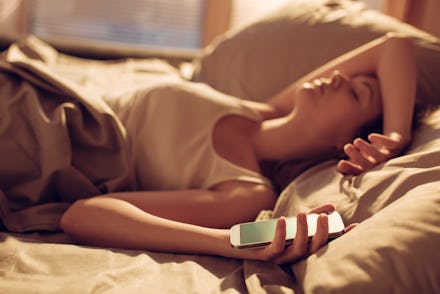Is hitting the snooze button bad for your sleep? Experts weigh in

My partner serially abuses the snooze button. Back when business travel was still a thing, a half dozen alarms would go off every five minutes before he absolutely had to get out of bed, or otherwise risk missing his flight. I was irritated, but also curious. I’d heard you should awaken as soon as your alarm rings — but why is hitting the snooze button bad for you? When I posed the question to sleep experts, they told me that the habit was counterintuitive; instead of giving us a little more rest, it'd likely make us more tired during the day.
But first, a refresher on the different stages of sleep. You go through four—stages 1 to 3, and rapid eye movement (REM) sleep — multiple times a night, according to Michigan Medicine. Stages 1 and 2 are periods of light sleep, stage 3 is deep sleep, and REM, even deeper sleep, is when most dreaming happens.
Contrary to what you might think, those spurts of sleep between alarms won’t leave you feeling more rested. You’re basically oscillating between sleep and wakefulness without reaching deep, restorative sleep, which takes longer than just a few minutes to enter, Xue Ming, a professor of neurology at the Rutgers New Jersey Medical School, who specializes in sleep disorders, tells me. To some extent, this resembles the experience of those with obstructive sleep apnea — who repeatedly stop breathing at night, causing them to awaken — which is why they often feel groggy the next day.
Hitting snooze can also prolong sleep inertia, that heavy, fog-brained sensation, most profound a few minutes after awakening, although it can last a few hours, explains Sara Benjamin, an instructor of neurology at Johns Hopkins Medicine, who also focuses on sleep disorders. “If you push snooze, and then wake up again to an alarm, you may have longer periods of the more profound sleep inertia, so it may take longer for you to function at your best level mentally.”
You might also fall into the habit of pressing the snooze button without realizing it. It’s not that you’re doing it in your sleep, but awakening for three seconds or so, just long enough to hit snooze. “You do wake up, but because it’s so short, you don’t remember,” Ming says. Benjamin adds that if you’ve done this, you’re most likely sleep deprived and have a strong drive to repay your “sleep debt,” or the amount of sleep you should’ve gotten but didn’t.
Long-term, hitting snooze on the reg may make your body less sure of its true wakeup time. “That may, in turn, affect your ability to fall asleep at the desired time to ensure sufficient sleep,” Benjamin says. Awakening at the same time every morning can help you synchronize your body’s sleep-wake cycle to the day-night cycle.
All of raises a larger question about whether our heavy reliance on the alarm is that healthy. “Ideally, the alarm clock should be a backup for waking up in the morning,” Benjamin says. “If we get sufficient nighttime sleep, we should be able to wake up naturally.” If you struggle to wake up to your alarm, try to sleep earlier in order to clock in enough sleep to feel refreshed in the morning. To help you fall asleep earlier, turn off your screens one to two hours before bedtime, or use light filters at the very least. As you wind down, turn off overhead lights and turn on soft, indirect lights instead.
And if you sleep seven to eight hours a night but still don’t awaken well-rested, Benjamin recommends talking to your doctor, who can help screen you for a sleep disorder and refer you for a sleep evaluation, if needed.
Basically, the snooze button is an illusion. Focus on the big picture of your day-to-day sleep schedule, rather than chasing a few fleeting minutes of sleep that won’t even provide the rest you crave.